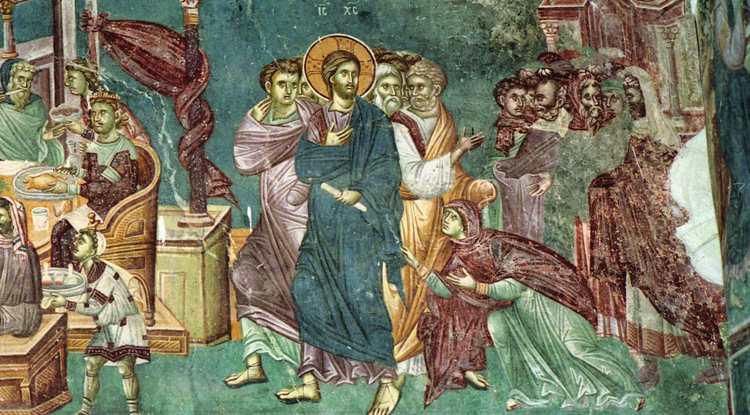On the second Sunday of February, we listened to a reading from the Gospel of the Holy Apostle Matthew about the Canaanite woman.
“And Jesus went out from there and departed to the region of Tyre and Sidon. And behold, a woman of Canaan came from that region and cried out to Him, saying, ‘Have mercy on me, O Lord, Son of David. My daughter is severely demon-possessed. But he answered her not a word. And His disciples came and urged Him, saying, ‘Send her away, for she cries out after us.’ But He answered and said, ‘I was not sent except to the lost sheep of the house of Israel.’ Then she came and worshiped Him, saying, ‘Lord, help me!’ But he answered and said, ‘It is not good to take the children’s bread and to throw it to the little dogs.’ And she said, ‘Yes, Lord, yet even the little dogs eat the crumbs which fall from their masters’ table.’ Then Jesus answered and said to her, ‘O woman, great is your faith! Let it be to you as you desire.’ And her daughter was healed from that very hour” (15.21–28).

It is an extraordinary event, but also paradoxical. First, it is noteworthy that the Canaanite woman had a feeling from the very beginning; she felt that the Savior could help her. This happens a lot and often in our lives. And it is an important moment. This feeling that God can help us is not foreign to Him. He somehow helped the Canaanite woman to understand that He could help her. It is like a tacit invitation from God or, as the Scripture and the Fathers say, it is the first grace.
We have that first grace, for example, when we join the monastery, when we get married, when we meet the right person, etc. It is like a conviction in our hearts that we are on the right track, that we have found what we were looking for. Then, of course, difficulties arise, and that grace/feeling lessens. But the important thing is to remember it, to remain faithful to it, and follow it. Because although we perceive it as something normal, it is an invitation from God to set out for Him. Then grace recedes, as we can see very well in today’s Gospel. Although this example is a much more dramatic one, we all encounter this in our relationship with God. We start with this feeling, that has such momentum, but then it seems that God no longer answers us. But then we must follow the Canaanite woman, who continued, persisted with her desire. She remained true to her feelings. Because when God says a word, when He grants grace, He remains faithful to His action. It is not so with us; we stagger until what He said is fulfilled. The typical example is Peter walking on water. He saw the Savior walking on the water and asked Him to command that he come to Him, which the Savior did. But when Peter saw the waves, he despaired and was rebuked by the Savior: “O you of little faith, why did you doubt?” (Matthew 14.31).
If at some point we feel that we need to do something and through it we draw closer to God, it is necessary to remain faithful, steadfast to the end of that feeling. Because that is what God wants. Until He fulfills our request, He knows better how to shape us along the way. And most of the time it is not easy at all. But we must believe unto the end because that is why He told us in the Gospel of Matthew: “Ask, and it will be given you; seek, and you will find; knock, and it will be opened to you” (7.7). He did not propose any other option, but He assured us that if we knock, it will open for us, only not to stop. And the best model is the Canaanite woman, because although she received the harshest treatment, she did not stop. After that first grace, a period of testing follows for us, to bring to the surface our true face. And this we see in the woman’s answer: “Lord, yet even the little dogs eat the crumbs which fall from their masters’ table.” An extraordinary, free answer, which can only occur in the encounter of a living man with the living God. Any closeness to Him will be transformative for us, it will engage and stir us.
The Canaanite woman is a true example of how to approach God, how to pray to Him, and especially how to remain faithful to the first grace, in which we feel His goodness. As for the trials that come after, let us overcome them through earnest prayer to Him. It is perhaps paradoxical, but our hearts need it so that we may know ourselves better, cleanse ourselves, and pray sincerely from the bottom of our hearts.
